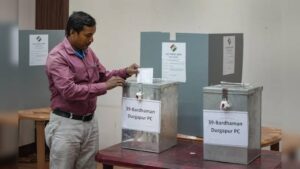
Today marks a significant phase in the Lok Sabha elections as voting commenced for 96 seats across various states. Among these, Andhra Pradesh leads with 25 seats, followed by Telangana with 17 seats, Uttar Pradesh with 13 seats, Maharashtra with 11 seats, and others including Madhya Pradesh, West Bengal, Bihar, Jharkhand, Odisha, and Jammu and Kashmir contributing to the electoral landscape.
This phase of voting is notable for the dominance of non-aligned parties such as Naveen Patnaik’s Biju Janata Dal and YS Jagan Mohan Reddy’s YSR Congress. While these parties have not formally aligned with either the ruling dispensation or the Opposition bloc, they have provided “issue-based support” to the Central government on several occasions in parliament.
Today’s voting occurs amidst growing scrutiny of the Election Commission’s role, particularly following the issuance of notices to the BJP and the Congress chiefs after controversial remarks made by Prime Minister Narendra Modi and Rahul Gandhi. The Election Commission’s actions have sparked questions from the Opposition regarding its impartiality and effectiveness in ensuring a fair electoral process.
As voters across these 96 constituencies exercise their democratic right, the outcome of this phase of voting will play a crucial role in shaping the political landscape of India. With the participation of diverse states and the influence of non-aligned parties, the results of this phase are eagerly awaited by political observers and citizens alike.

